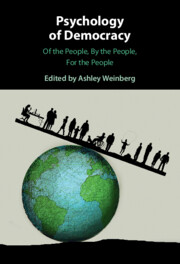Book contents
- Psychology of Democracy
- Psychology of Democracy
- Copyright page
- Contents
- Figures
- Tables
- Contributors
- Preface
- Acknowledgements
- Chapter 1 Psychology of Democracy
- Part I Of the People
- Part II By the People
- Chapter 8 Trust in Political Institutions and Support for Authoritarianism
- Chapter 9 New Technology, Language and Gesture in Contemporary Indian Political Discourse
- Chapter 10 Fact or Fiction
- Chapter 11 Dissecting the Psychology of a Voter
- Chapter 12 Building Trust through a Revolving Door of Leaders:
- Chapter 13 After the Party Is Over
- Part III For the People
- Index
- References
Chapter 12 - Building Trust through a Revolving Door of Leaders:
The Poisoned Chalice
from Part II - By the People
Published online by Cambridge University Press: 24 February 2022
- Psychology of Democracy
- Psychology of Democracy
- Copyright page
- Contents
- Figures
- Tables
- Contributors
- Preface
- Acknowledgements
- Chapter 1 Psychology of Democracy
- Part I Of the People
- Part II By the People
- Chapter 8 Trust in Political Institutions and Support for Authoritarianism
- Chapter 9 New Technology, Language and Gesture in Contemporary Indian Political Discourse
- Chapter 10 Fact or Fiction
- Chapter 11 Dissecting the Psychology of a Voter
- Chapter 12 Building Trust through a Revolving Door of Leaders:
- Chapter 13 After the Party Is Over
- Part III For the People
- Index
- References
Summary
This chapter draws upon Australian prime ministers and their attempt to (re)build trust through their actions regarding two long-term policy issues, asylum-seekers and climate change, as well as an immediate major event occurring during their respective prime ministerships. To help us further ground this analysis, we draw upon data from three prime ministers’ press conferences, examining their responses to questioning within the theoretical lens of trust. The research reveals that building or rebuilding trust is essential in any relationship, but especially so today in terms of political leadership in liberal democracies. They illustrate how competence is regarded as crucial in building trust with colleagues and the public, while integrity is especially important for leaders who enter the job with less perceived legitimacy than a leader who was elected and hence has a mandate to implement their policy platform. Crucially though, a leader who ignores integrity does so at their own peril, as it gives a potential challenger ammunition for a tilt at the leadership position. The leadership needs to send positive messages of unity rather than division and individual aspirations if trust is to be built or rebuilt. In earlier research, we revealed that what one says and how one says it can be important. Politicians who tended to acknowledge successes due to the collective group of their own party, rather than themselves, benefitted greatly in the situations at hand. Thus, (re)building trust becomes more important than ever for political leaders but, perhaps, also more difficult than ever.
- Type
- Chapter
- Information
- Psychology of DemocracyOf the People, By the People, For the People, pp. 265 - 285Publisher: Cambridge University PressPrint publication year: 2022



